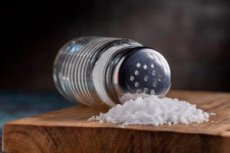New publications
Excess sodium intake may increase the risk of eczema exacerbations
Last reviewed: 02.07.2025

All iLive content is medically reviewed or fact checked to ensure as much factual accuracy as possible.
We have strict sourcing guidelines and only link to reputable media sites, academic research institutions and, whenever possible, medically peer reviewed studies. Note that the numbers in parentheses ([1], [2], etc.) are clickable links to these studies.
If you feel that any of our content is inaccurate, out-of-date, or otherwise questionable, please select it and press Ctrl + Enter.

A UCSF study found that changes in daily salt intake may explain eczema flare-ups.
A high-sodium diet may increase your risk of eczema, according to a study by researchers at the University of California, San Francisco (UCSF). They found that consuming just one more gram of sodium per day — the amount found in a Big Mac — increased the likelihood of flare-ups by 22%.
Eczema, also known as atopic dermatitis, is a chronic condition that causes dry, itchy skin. It is one of the most common skin conditions, affecting more than 31 million people in the United States, and one in 10 people will experience it at some point.
Eczema has become increasingly common in recent years, especially in industrialized countries, which is linked to environmental and lifestyle factors such as diet.
Sodium, which most people consume in the form of salt, increases the risk of hypertension and heart disease. Scientists have recently discovered that sodium is stored in the skin, where it may play a role in inflammation in eczema.
Limiting sodium intake may be an easy way for eczema patients to manage their condition.
"Most Americans eat too much salt and can safely reduce their intake to recommended levels," said Catherine Abuara, MD, associate professor of dermatology at UCSF and lead author of the study published in JAMA Dermatology.
"Eczema flare-ups can be difficult for patients," said Abuara, who is also an assistant professor of epidemiology at the UC Berkeley School of Public Health, "especially when they can't anticipate them and don't have guidance on what they can do to avoid them."
In their cross-sectional study, the researchers analysed data from more than 215,000 people aged 30 to 70 years from the UK Biobank, including urine samples and electronic health records.
They could determine how much sodium each person was consuming from urine samples; they could also see whether people had been diagnosed with atopic dermatitis, as well as its severity, from prescription codes.
They found that each additional gram of sodium excreted in urine over 24 hours was associated with an 11% higher odds of being diagnosed with eczema, a 16% higher odds of an active case, and an 11% higher odds of increased severity.
They then studied 13,000 adults in the US as part of the National Health and Nutrition Examination Survey and found that consuming just one extra gram of sodium per day – about half a teaspoon of salt – was associated with a 22% higher chance that someone would have an active case of eczema.
